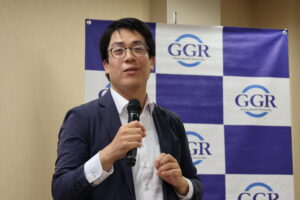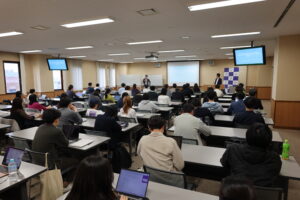On April 17, 2025, the Institute for Global Governance Research (GGR) at Hitotsubashi University hosted a Talk Session titled “Reconsidering Yoshida Shigeru’s Security Conceptions: Rearmament and Internal Security System,” featuring Dr. Goro Fujita, Assistant Professor of Political Science and Economics at Waseda University.
Dr. Fujita revisited Prime Minister Yoshida Shigeru’s strategic approach in the early 1950s, particularly around the time of the U.S.-Japan Peace Negotiations. He challenged the conventional understanding of the “Yoshida Doctrine” by highlighting the strong link between Yoshida’s opposition to rapid rearmament and his internal security policy. This connection, he argued, is key to understanding Japan’s postwar security posture and its alignment within the U.S.-led Western bloc.
The speaker explained that Yoshida’s resistance to large-scale rearmament was not merely economic or pacifist in nature but rather a calculated strategy to preserve internal stability. While supporting the continued presence of U.S. forces in Japan, Yoshida opposed expanding Japan’s own security forces, such as the National Police Reserve. Instead, he sought to position Japan as a responsible Cold War partner by strengthening domestic security, particularly against communist threats. A turning point in Yoshida’s security strategy came with the submission of the “Suggested Agenda” to U.S. envoy John Foster Dulles on January 30, 1951. In it, Yoshida proposed a dual approach: reinforcing U.S.-Japan security cooperation while committing to expanded internal security responsibilities, including increased police and maritime personnel.
During the Q&A session, a notable question was asked: “Considering Yoshida Shigeru’s cautious stance on rearmament, do you think Japan’s constitutional framework played a role in shaping or reinforcing his security policy? In your view, did constitutional constraints have any practical influence on the implementation of Yoshida’s approach?” Dr. Fujita responded that the legal perspective is of great importance and that Article 9 of the constitution did shape the broader context of the security policy, however it was not the decisive factor in Yoshida’s decision-making.
Dr. Fujita concluded that Yoshida’s cautious stance on rearmament reflected a pragmatic and strategic vision that enabled Japan to contribute to Western security efforts without compromising its pacifist identity. The talk provided a fresh perspective on Yoshida’s leadership and encouraged further examination of how domestic and international considerations were intertwined in shaping Japan’s early Cold War foreign policy.
[Report Prepared By] Billal Hossain(Doctoral Student, Graduate School of Law, Hitotsubashi University)


